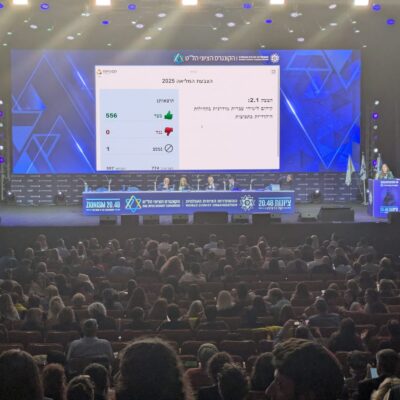A National Opportunity to Transform Local Communities
by Dr. Hal M. Lewis
In “The Case for National Jewish Philanthropy” (eJewishPhilanthropy, March 28, 2012), Yossi Prager thoughtfully delineates “a few examples of functions … best addressed nationally for the benefit of local institutions.” In response to his invitation for further discussion, I would add to that list a single item: the training and development of Jewish communal leaders.
For years North American Jewish organizations and institutions have dabbled in what purports to be leadership training for both professionals and the laity. We have done so without a continental mandate or an overarching vision. Leadership programs vary from city to city, from agency to agency. With striking consistency, we have ignored best practices, often conflating Jewish literacy or the teaching of technical skillsets (budgeting, marketing, fundraising, etc.) with real leadership development and training. And specifically to Prager’s point, not only has quality control been uneven at best, we have created a melange of local leadership programs with insufficient funding in the design, execution, and evaluative phases.
From my vantage point as the CEO of an institution committed to the training and development of nonprofit leaders, North American Jewry suffers from the lack of a systemic approach to leadership training. It has long been know that despite the differences between organizations and communities, insofar as the pool of leaders is concerned North American Jewry closely resembles a single system. Professionals and clergy on a career trajectory are likely to change jobs and cities throughout their working lives. A JCC professional in one city may become a federation executive in another. A synagogue youth worker in the southeast may go on to become a Hillel director in California. So too, lay leaders relocate repeatedly and in so doing, transport their volunteer commitments from one community to another. Like other systems, a family or the human body for instance, what happens in one part has ramifications throughout. When one component of the system is broken, the entire system suffers. And conversely, fixing one aspect of a broken system is likely to facilitate improvement system-wide. In such an environment, the notion that every community or organization should be on its own when it comes to training leaders is not only an antiquated perspective; it is bad business.
A serious commitment to leadership training and development on the national level would lend prestige and urgency to these issues. It would affirm that we are finally ready to address the crises in leadership in our organizations, rather than allowing leadership training and development to continue languishing on the back burners of our communal agendas. As we have seen with our graduate students and continuing education participants at Spertus, including those in our newly inaugurated Certificate in Jewish Leadership with Northwestern University, Jewish organizations invest half-heartedly at best in the training of their lay and professional leaders. And more often than not, resources for these purposes are among the first to be eliminated during difficult economies. Only an overarching commitment to harness the intellectual and philanthropic firepower of North American Jewry will change this situation.
In advocating for a national commitment to leadership training and development, I am not calling for a one-size-fits-all approach. Local communities and individual organizations must always retain a degree of influence and input into curricular and program design. At the same time, however, the experience of many Jewish groups suggests that leadership programs are often cobbled together haphazardly by those with better intentions than expertise in these matters. A national approach to effective leadership training could bring to the table the best minds from the academy, the corporate arena, and the social sector to craft a template or series of templates to guide local communities. Identifying the key components of effective leadership training, from psychometric instruments to coaching, would help set a standard for all who wish to adapt and incorporate them at the local level. Further, making clear that real leadership training is a protracted process, that it cannot be accomplished in a single weekend retreat, will help to recalibrate expectations and affirm the importance of investing seriously in those who lead our agencies and communities.
Making leadership training a national priority would help to address the challenges local communities face insofar as faculty and presenters are concerned. As we have learned at my own institution, creative use of technology, along with a core faculty, allows nonprofits with tight budgets to extend their reach and provide meaningful training opportunities even within difficult financial constraints.
This call to make leadership training a national priority does not come with the expectation that the mega-philanthropists would shoulder the entirety of the burden. I accept Prager’s assessment that “national funding provides a temporary lift, not a permanent answer.” And indeed, at Spertus we have designed leadership programs that are funded by both philanthropy and earned income. But neither would I underestimate the need for a “temporary lift,” particularly one that comes with the imprimatur of American Jewry’s leading philanthropists, successful leaders in their own right. Our agencies and institutions, on both the lay and the professional side, are crying out for real leadership training on a broad basis. Too few of those responsible for the future of our organizations have any familiarity with classical Jewish teachings on effective leadership or with best practices on issues ranging from leadership ethics to power sharing, from visioning to collaboration.
With precious few exceptions, our communities have been playing at leadership training for years. We invoke the word leadership to mean everything from well-meaning volunteers to wealthy donors, or anyone who holds a titled position in the enterprise. And what passes for programs of leadership training in our organizations often involves neither leadership nor training. We have the capacity to do this right, and to do it well. And in a Jewish world in which the place and value of our organizations and institutions are being challenged daily, a renewed commitment to real leadership may be more important than ever.
Dr. Hal M. Lewis, a nationally known expert on Jewish leadership, is the President and Chief Executive Officer of Spertus Institute of Jewish Studies in Chicago.

 Add EJP on Google
Add EJP on Google









